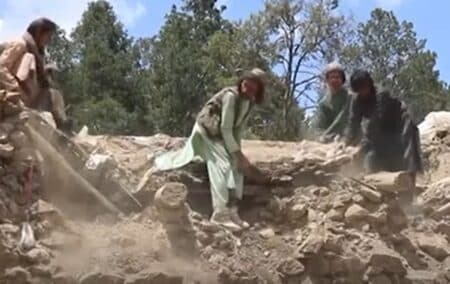Heavy rain, meagre resources and rugged terrain are hampering rescuers in south-east Afghanistan, where a powerful earthquake is reported to have killed more than 1 000 people, according to the BBC.
Some 1 500 people were also injured, officials say.
The BBC reports that unknown numbers were buried in the rubble of ruined, often mud-built homes by the magnitude 6.1 earthquake.
Afghanistan’s health system was facing near-collapse even before the disaster.
The Taliban authorities have called for more international aid. Communication networks are also badly hit.
Reuters quoted a Taliban spokesman as saying: ‘We can’t reach the area – networks are too weak.’
Survivors and rescuers have told the BBC of villages completely destroyed near the epicentre of the quake, of ruined roads and mobile phone towers – and of their fears that the death toll will rise further.
The earthquake struck the eastern province of Paktika on Tuesday, with tremors reportedly being felt as far away as India.
Afghanistan is located in a tectonically active region, meaning that earthquakes are common and often relatively mild. However, Robert Sanders, a seismologist with the U.S. Geological Survey, explains that given the prevalence of poorly built houses, unstable terrain, and high population density in certain areas of Afghanistan, earthquakes that would otherwise be considered mild often result in catastrophic loss of life and a great deal of devastation to the country’s infrastructure.
Footage from the aftermath of the earthquake showed rescuers searching for survivors in heaps of rubble and transporting the seriously injured in blankets to waiting helicopters, while those with less serious injuries were seen being treated on the ground.
The United Nations is among those scrambling to provide emergency shelter and food aid to remote areas in the worst-hit Paktika province.
Complicating the rescue effort is the fact that the two-decade war with the US has left Afghanistan’s emergency aid resources severely depleted. This has prompted Taliban officials to appeal to international aid agencies for assistance.
‘We urge all aid agencies to send teams to the area immediately to prevent further catastrophe’, tweeted Bilal Karimi, a spokesman for the Taliban.
However, given that many international aid agencies left the country over safety concerns following the withdrawal of the US military last year, help may not arrive as soon as Afghans would hope.
Tuesday’s earthquake was the deadliest since 2002 when the northern part of the country was struck, resulting in the death of 1 000 people.

